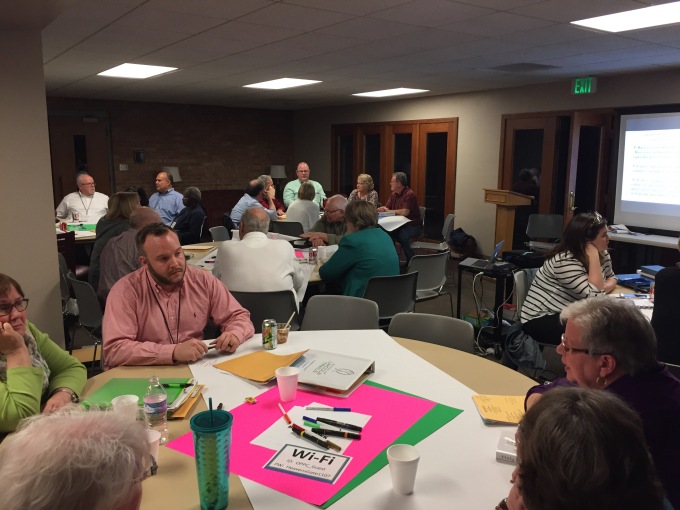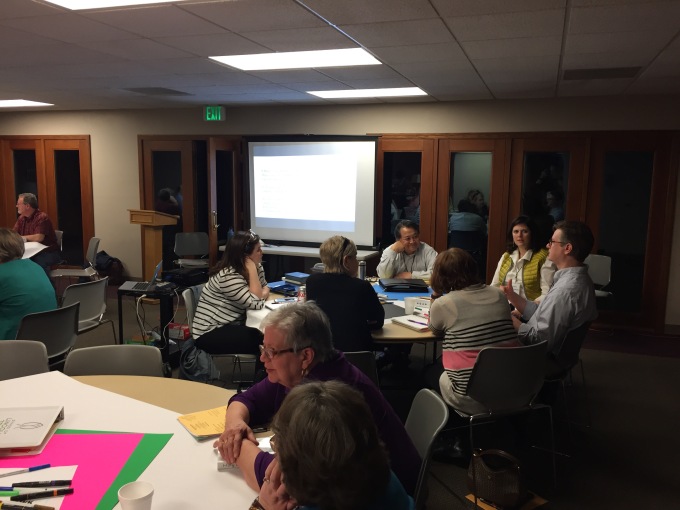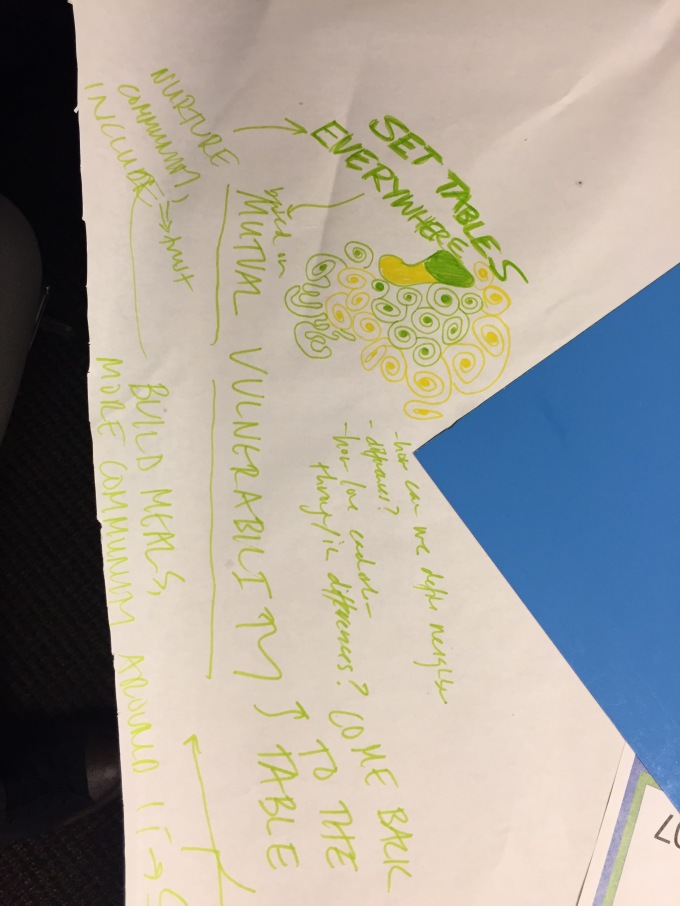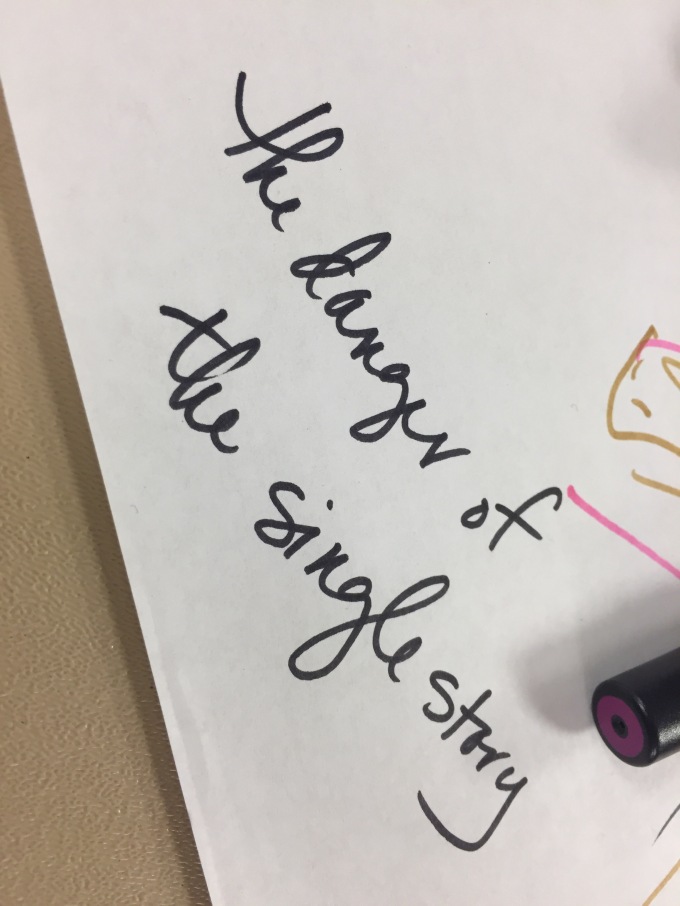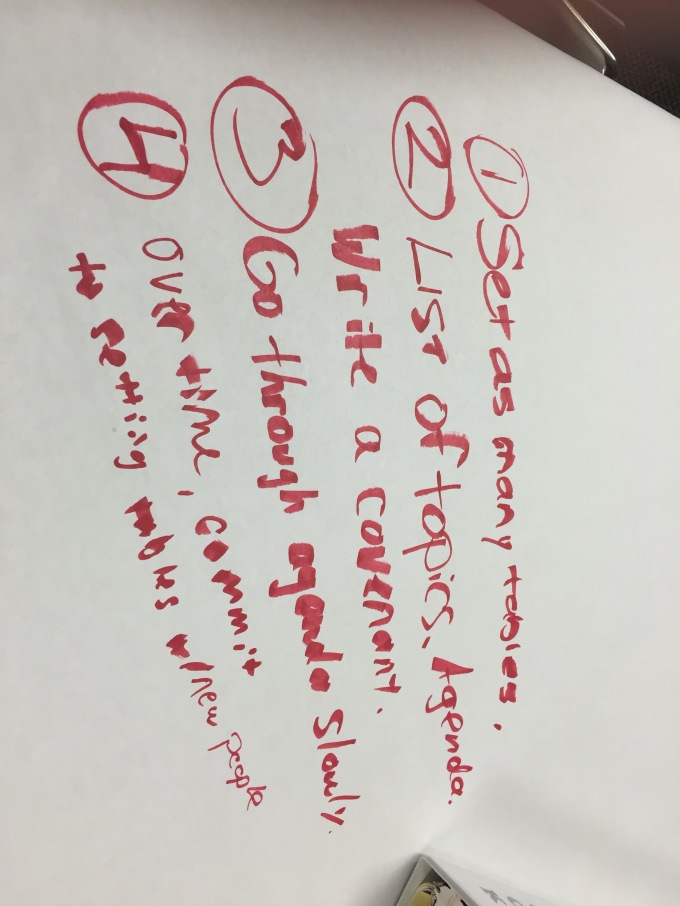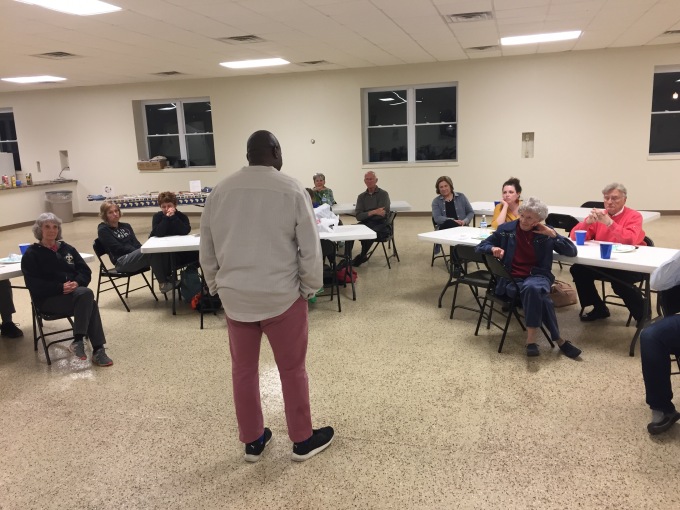 |
Garlin Gilchrist III speaking about his bid for
City Clerk at Lauren Hood's SpeakEasy
|
So, I wanted to write a stellar blogpost about the challenges of Detroit that I've come to see, now living here for a year. I want to write a whole piece about over-privilege and arrogance and delusion and racism and the profitability, both economically and politically, of negative stereotyping of brown-skinned people and how that is the real reason Detroit looks like it does, but can't quite find an entry point. Possibly here....did those of you who live in the suburbs know that in the 1950s onward, before Civil Rights legislation put an end to it, that white families, and
only white families, were encouraged to move to the suburbs because the government provided all kinds of financial subsidies making loans easier to access and the ability to own a large suburban home more affordable than renting in the city?
(But, again, only if you were white, very clearly, written into the laws. Talk about how big government has supported and created economic gains for some people, and their descendants, who currently lash out at government assistance for people who are financially struggling. Do they know that their ability to amass such a comfortable living, and for some, the ability to go far beyond that, was sparked by a massive welfare program that literally created suburbia?)
However, this blog keeps urging me to get personal, to be vulnerable and honest. Authentic. And to reflect, once again, on my need to dismantle some of my own Whiteousness.
Last week I was inducted into the 6th Team of the
Challenge Detroit Fellows. It was an immersive week learning about critical work being done by awesome networks of people in Detroit, and a week of learning how the history I alluded to above creates a particularly complicated set of obstacles for moving forward. But one thing kept nagging me all week:
I feel too old for this.
I admit, I looked around the room at the Millennials and kept feeling like, "I should be elsewhere, I should be further along than this, why can't we get
The Table Setters to jump to the next level yet?" Though the Challenge Detroit staff reassured me that every year there are people in their late 30s and some who already have kids, it would seem that this particular year, I'm that guy. I'm the only one who's married, the only one with kids. It didn't help when one of the presenters, who I've known this year from other networking, asked me, "aren't you too old for Challenge Detroit?" And of course, a peppering of comments in sessions like, "you all are too young to remember VHS tapes," etc.
But then, on our final day,
Maggie DeSantis, founder of Building the Engine of Community Development in Detroit, kept explaining her lifelong journey through advocacy and community engagement as "circuitous." There was no real map to get to where she's at.
Circuitous. Circuitry. Connections and energy flow and repair and rewiring and restoring and reminders. My fuses have been a bit blown out from the past year.
A few days earlier, we had done a high ropes challenge as a team. With my climbing partner, Jasmine, we were supposed to get ourselves up a hanging ladder made for a giant. The rungs were too far apart to reach without working together. We were about 2/3 of the way up and feeling like giving up (both of us enjoyed a gratuitous use of the word "motherf***er uttered in harsh whispers only the two of us could hear.) And Arnesha, from down below, called up to me, "go Matt, you're a dad, you can do anything!" She literally flipped and recharged the phrase that I had been muttering internally (
ugh, you're the old dad), to a statement of respect and empowerment.
A resurgence of energy infused me, and Jasmine and I made it to the top. Jasmine literally pulled me up to the final rung and then we both grabbed the top of the platform.
Maggie DeSantis described her circuitous route, and I started remembering something, something I've known for decades now, something I was in danger of forgetting. In the
Prison Creative Arts Project, we used to engage in this activity called "Cops In The Head," which was part of Augusto Boal's Theater of the Oppressed. One person was to imagine all the people who've spoken into their lives, positively and negatively, and then assign those people to be characterized by the rest of the group. The person would explain the roles: like a coach who had encouraged; a grandmother who was always mean and judgmental, etc. The person would walk through this group, gauntlet-style, and the negative people would shout discouragement while the positive people would whisper closely in your ear to help you get through the staged turmoil. Everyone always cried, even the biggest muscled men I worked with years ago on the inside.
Here I was feeling too old, feeling like I had somehow failed to achieve "what I'd been supposed to have achieved by now." But Maggie got me thinking about cops in my head, and the voices of guidance and love, too.
I was succumbing to my own Whiteousness. I won't name names (so don't ask), but there have been suburban neighbors and even family members who ask questions that deeply imply, or outright state, that I'm not yet good enough, stirring up the overwhelming narrative of where a man, and definitely a white man, should be at this state in his life....
But voices like Arnesha's cut through that last week. I'm a dad. She doesn't know this, but my first month as a dad was horrible, and it set a precedent of insecurity that still haunts me today. I've worked hard to redeem that, and the joy of being the person who delivered our second child is something that, even as I type this, nearly brings tears to my eyes. And so I remembered, that all along the way, it has been primarily African American folks, mostly women, who've offered me the most reminders of my worth and my capabilities. (Remember Matthew, you wrote this not too long ago:
To the Black Women Who Loved the Death out of Me.) It was the black mothers and aunties in New Orleans who first addressed my debilitating perfectionism with love, grace, and humor. It was Latinas in Los Angeles who fed us and allowed us to be part of their families' lives that taught me what it really means to take care of a family, despite great odds and daily fears. It's important to note that almost all of these women love and follow Jesus, too.
This past year has been monumental, with all "the feels" (a new phrase I'm learning from my Millennial peers.) We've had great blessings: housing and neighbors and a diverse school community and outreach to us. We've almost let the stress of not finding jobs to tear our marriage apart. I'm not saying that lightly.
On the job front, though, I also needed to confront some of my expectations and internal pressures based on the privileges I've been brought up with. It is clear to me that I've been created to build bridges between racial, socio-economic, and interreligious divisions we've allowed to fester in our country for far too long. I am passionate about deconstructing narratives that have favored abusive rises to power on the backs of others. In our country, that is White Supremacy. Period. Full Stop. Given that sense of call on my life, my job journey just may well be "circuitous."
I recently had the privilege, yes privilege, of being a co-panelist with the brilliant
Dennis Talbert, and he helped to break apart the buzzword of "white privilege." It comes down to how many opportunities are laid out in front of you. Opportunities to get jobs, opportunities to get invited to attend life changing events, opportunities to exist in a way that is less about mere survival and more about moments of really thriving. I've had more opportunities laid out before me than most of the students I've had the privilege of teaching. I would say it also comes down to how many chances you get if you make a mistake, which I suppose is also another way of saying, "how many opportunities will you be granted to prove your worthiness and goodness in society."
I applied to all kinds of non-profit jobs, ministry roles, community engagement and development roles throughout these past 12 months while driving for Lyft (a specific opportunity available to me because I have the privilege of owning a car) and working as a part-time teacher evaluator. Not once, but several times, I knew I was a top choice as I was called in for several final interviews. But I didn't get the jobs, and I was becoming increasingly heartbroken and fearful. As a finalist, I was invested in who actually got those jobs, and 90% of them went to black men and women who had lived in Detroit proper their entire lives, or at least much longer than myself.
And this is right. I can hear some of you, (in fact, some of you have said it directly),
but isn't that reverse racism? Isn't that discriminating against you because you're white? Do you know that, sadly, most of the jobs in the city today are held by white people from the suburbs? Maybe you don't care about that, but those of us who are fighting for justice and equity in the level of opportunities have to accept the fact that it means that if we are successful, white men like myself might have to learn a bit of something that people of color have had to have, in abundance, for decades: patience. Patience, and of course, just a fraction of the patience that's been endured by people who look different than myself. And, for the person who asked me if this was reverse racism, did it ever occur to you that I may not have been as qualified as the people who got the jobs? Even if all things were equal in terms of qualifications, I stand fully supportive of the fact that my non-profit directing experience in LA was seen as less preferable than a person who has worked hard alongside their parents to endure the lack of jobs in Detroit all these years. That certainly offers them an edge on my experience. If we are both wanting to work to create more job opportunities for Detroiters to work in Detroit, especially the communities of color who've been shut out of too many roles for too many years, my lack of being hired makes sense. It is
just.
But this year also meant I had to keep experiencing rejection. Which is always hard, especially for a perfectionism-prone mindset like mine. I've woken up hearing the voices:
what's wrong with you, why can't you find a job, you should've done this instead of that, you should've.....and then
Teen HYPE called a few months ago offering me a job alongside becoming a Challenge Detroit Fellow. I'll write more about Teen HYPE in the future, but for now, it's been an honor to step into a program that celebrates the youth of Detroit by confronting barriers and building bridges. And I heard
Levi's voice from years ago inside Western Wayne Correctional Facility, encouraging me to help tell the full and honest stories.
Last week, the team of fellows were invited to attend
Detroit Homecoming. It was, again, all the feels. Exciting, infuriating, confusing, inspiring, exhausting, and fun. And humbling, for me. Because here I was coming off a week of feeling old and, full disclosure, a little arrogantly "above" all these younger folks in my cohort. Detroit Homecoming was very well attended, it was noisy and abuzz with energy the entire time. Though we weren't supposed to do this, and even got in a little bit of hot water afterwards, the team of fellows began to send group messages to each other during upsetting moments of presentations; during moments where someone didn't understand a policy being described, to celebrate the Diva-tastic moments of Mary Wilson. It was bonding. It was informative. It was sneaky, sure, but I wouldn't trade it in. We were all helping each other to stay engaged and up to speed with what was going on, especially during a two day period where we had very limited time to reflect and process.

I felt part of the team. I felt cared for. I noticed others weighing in and questioning and supporting and challenging one another. Eric and Monti taught me about the United Nations'
17 Sustainable Development Goals. I learned phrases I had always wondered at the meaning. Summar helped out by taking my daughters to the stadium bathroom at the Tigers' game. I felt like this is going to be an important step in my circuitous path.
So here I am, the guy who preaches to appreciate all kinds of diversity and the blessings and challenges that arise from that, the guy who says you've got to push through the awkward discomfort and even the offensiveness sometimes to discover our mutual value....I had to relearn that Millenials are incredible and sometimes when they (and me) are on our phones we aren't less engaged: we're super engaged and working through this. ( But, of course: we should not be on our phones in intimate neighborhood meetings when people are expressing their hopes and dreams!)
I am looking forward to working with this team all year. I hope that my experiences have something to offer, and yes, even my age. But I can already sense that I have much to learn on the road ahead from these effervescent and deep thinking people in their twenties. The energy is palpable.
Circuitry. A circuitous route, but a valid one nonetheless, as Maggie reminded me. I can't wait to keep plugging in, networking, finding how to best use our energy and ideas to really celebrate what has been going well in Detroit despite great obstacles, and how we can move forward together. Racially, generationally, socio-economically, and amidst the variety of our belief systems and backgrounds. We all have something to offer, we truly all do. Less factions, and more interconnected, intersectional, ebb and flow of energy and ideas and hope.
+Matthew John Schmitt - The Table Setters
@matthewjschmitt







































